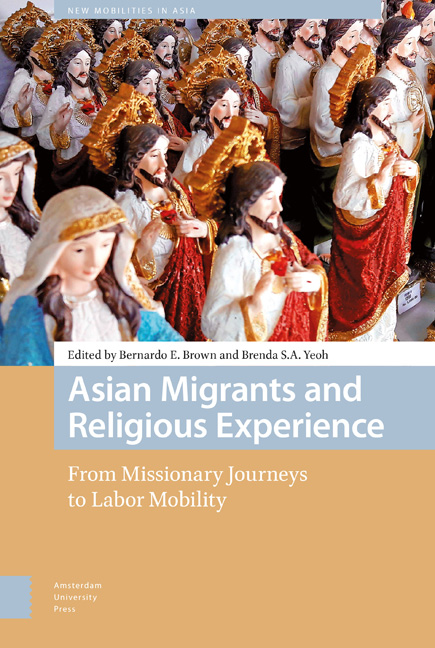Book contents
- Frontmatter
- Contents
- List of Illustrations
- Acknowledgments
- 1 Introduction: Human Mobility as Engine of Religious Change
- Section 1 Mobile Religious Practices
- 2 Saving Yogis: Spiritual Nationalism and the Proselytizing Missions of Global Yoga
- 3 Renewed Flows of Ritual Knowledge and Ritual Affect within Transnational Networks: A Case Study of Three Ritual Events of the Xinghua (Henghua) Communities in Singapore
- 4 Liberalizing the Boundaries: Reconfiguration of Religious Beliefs and Practice amongst Sri Lankan Immigrants in Australia
- Section 2 Transnational Proselytizing
- 5 From Structural Separation to Religious Incorporation: A Case Study of a Transnational Buddhist Group in Shanghai, China
- 6 “10/40 Window”: Naga Missionaries as Spiritual Migrants and the Asian Experience
- 7 Religion, Masculinity, and Transnational Mobility: Migrant Catholic Men and the Politics of Evangelization
- 8 Helping the Wounded as Religious Experience: The Free Burma Rangers in Karen State, Myanmar
- Section 3 Refashioning Religiosity in the Diaspora
- 9 A Multicultural Church: Notes on Sri Lankan Transnational Workers and the Migrant Chaplaincy in Italy
- 10 “Bahala Na Ang Diyos”: The Paradox of Empowerment among Filipino Catholic Migrants in South Korea
- 11 Feeling Hindu: The Devotional Sivaist Esthetic Matrix and the Creation of a Diasporic Hinduism in North Sumatra
- 12 Afterword: What Makes Asian Migrants’ Religious Experience Asian?
- References
- Index
10 - “Bahala Na Ang Diyos”: The Paradox of Empowerment among Filipino Catholic Migrants in South Korea
Published online by Cambridge University Press: 12 December 2020
- Frontmatter
- Contents
- List of Illustrations
- Acknowledgments
- 1 Introduction: Human Mobility as Engine of Religious Change
- Section 1 Mobile Religious Practices
- 2 Saving Yogis: Spiritual Nationalism and the Proselytizing Missions of Global Yoga
- 3 Renewed Flows of Ritual Knowledge and Ritual Affect within Transnational Networks: A Case Study of Three Ritual Events of the Xinghua (Henghua) Communities in Singapore
- 4 Liberalizing the Boundaries: Reconfiguration of Religious Beliefs and Practice amongst Sri Lankan Immigrants in Australia
- Section 2 Transnational Proselytizing
- 5 From Structural Separation to Religious Incorporation: A Case Study of a Transnational Buddhist Group in Shanghai, China
- 6 “10/40 Window”: Naga Missionaries as Spiritual Migrants and the Asian Experience
- 7 Religion, Masculinity, and Transnational Mobility: Migrant Catholic Men and the Politics of Evangelization
- 8 Helping the Wounded as Religious Experience: The Free Burma Rangers in Karen State, Myanmar
- Section 3 Refashioning Religiosity in the Diaspora
- 9 A Multicultural Church: Notes on Sri Lankan Transnational Workers and the Migrant Chaplaincy in Italy
- 10 “Bahala Na Ang Diyos”: The Paradox of Empowerment among Filipino Catholic Migrants in South Korea
- 11 Feeling Hindu: The Devotional Sivaist Esthetic Matrix and the Creation of a Diasporic Hinduism in North Sumatra
- 12 Afterword: What Makes Asian Migrants’ Religious Experience Asian?
- References
- Index
Summary
Abstract
Based on narratives of Filipino (un)documented migrant workers and marriage migrants in South Korea, this chapter examines how migrants make sense of their migration experiences as a religious journey and as a spiritual calling. At the individual and community levels, Filipino migrants employ their lived and organized religion as empowering and enabling strategy to mitigate the alienating, precarious and isolating aspects of migration experiences. I argue that the process and strategy of empowerment is a paradoxical dynamics which necessitates interventions from local and/or transnational organizations which have the capacity and credibility to provide empowering spaces and infrastructures. Furthermore, this “mediated empowerment” is double-edged as it advocates migrant agency but also serves as policing and regulating apparatus.
Keywords: migrant empowerment, migrant agency, Catholic Church, Filipino migrants, South Korea
The past two months were a test of survival. All my dreams and hopes could have crashed down. I was worried that all doors would shut on me. But I decided to keep quiet and continuously seek God as my armor amidst all frustrations… As an undocumented worker, I have to work hard to survive, do my best and be patient in everything. Emotionally drained, thinking if I could still work here or not, given that many new documented workers are coming to replace us… Prayers are my weapons in overcoming my fate. Last Monday, I was informed that the company is still keeping us. If you leave it all up to God, He provides.
These are but a few of Juan's posts on his Facebook wall making sense of his migrants’ experiences and trajectories through the lens of religion and spirituality. Like Juan, an undocumented migrant worker in South Korea for twelve years, many Filipino migrants construct and interpret their migration journeys using their religious beliefs and practices. To a large extent, religion has become a framework for many migrants to: 1) comprehend their sense of displacement and experiences of downward social mobility, legal liminality, and occupational precarity; and 2) “maintain self-cohesion, self-continuity and self-esteem” (Marcus & Rosenberg 1995, 81) in their everyday lives.
- Type
- Chapter
- Information
- Asian Migrants and Religious ExperienceFrom Missionary Journeys to Labor Mobility, pp. 243 - 270Publisher: Amsterdam University PressPrint publication year: 2018



